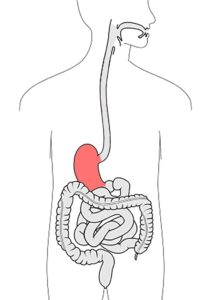
FAQ - Patient
What is it?
Helicobacter pylori is a bacterium.
It is slightly curved in the form of a helix so it was named Helicobacter.
Some of its cousins are longer and you can see the helix better.
The bacteria are the long squiggly ones, not the little roundish dots.

When do you get it?
Most people catch it before they are five or six years old. The problem is that the human stomach and its immune system can’t get rid of it by itself. As a result, Helicobacter can colonize the human stomach for decades if not for life.
Where does it come from?
About the only place it has ever been found is the stomach of humans and some monkeys. It has been with humans for a very long time, and has been found in mummies in the Andes for instance. A whole set of cousin helicobacters colonize the stomachs of other mammals.
What does it cause?
Most people only get gastritis, that means an irritated stomach lining, with no pain or other symptoms. A few people who have the infection get stomach or duodenal ulcers. (The duodenum is the part just after the stomach, just before the regular small intestine begins.)
A very small minority (less than one percent) of infected people get stomach cancer. Helicobacter pylori was the first bacterium to be officially recognized as a cancer-causing agent.
A very small minority (less than one percent) of infected people get stomach cancer. Helicobacter pylori was the first bacterium to be officially recognized as a cancer-causing agent.
What does it not cause?
It doesn’t cause gastro-oesophageal reflux disease, oesophagitis, coeliac disease, inflammatory bowel disease (for example Crohn’s disease), colon cancer or much of anything else in the intestine.
Will I give it to my relatives?
Probably not to other adults. We are not quite sure how it is transmitted but no one has ever been able to show transmission between spouses. Transmission probably occurs within families, most likely from child to child or from mother to child.
Why so many different drugs?
It produces a substance that neutralizes the stomach acid just around itself. This is how it is able to withstand the acidic environment of the stomach in order to survive. Pretty slick trick, huh? Since the bacteria are well protected in the mucous lining of the stomach, they are hard to get rid of. It takes two different antibiotics and since a lot of antibiotics don’t work as well in acid, you have to take another medicine to neutralize the stomach acid.
That way the antibiotics can work from the outside (inside the stomach that is) and from the inside, coming back into the stomach lining from the blood stream.
That way the antibiotics can work from the outside (inside the stomach that is) and from the inside, coming back into the stomach lining from the blood stream.
Will I get it again?
Probably not, re-infection rates are very, very low. Some people think that they have gotten it again when really they never got completely rid of it in the first place. Since it is hard to get rid of, sometimes the first course of antibiotics doesn’t work.
Here is a useful link for more information. http://www.helico.com
Helicobacter pylori is a spiral shaped bacterium that lives in the stomach and duodenum (section of intestine just below stomach). It has a unique way of adapting in the harsh environment of the stomach.
Here is a useful link for more information. http://www.helico.com
Helicobacter pylori is a spiral shaped bacterium that lives in the stomach and duodenum (section of intestine just below stomach). It has a unique way of adapting in the harsh environment of the stomach.
FAQ’s about the Group
What is AHMSG?
AHMSG is Africa Helicobacter and Microbiota Study Group a body that is comprised of experts from several African countries with a mission of developing treatment guidelines for Helicobacter pylori infections in Africa, this is in addition to advance H. pylori research on the continent.
Who can be a member of AHMSG?
Gastroenterologists, pathologist, general medical practitioners, microbiologist, molecular biologist, medical laboratory scientists etc. who have interest in <em<H. pylori research.
Can I attend AHMSG Meetings?
Calls for application to attend AHMSG workshops are made on the Group’s web site and submission could be made online via an application link.
Is AHMSG a profit making organization?
AHMSG is a non-profit organization that depends on sponsorship from donors, industries and willing organizations.
Can I support AHMSG?
AHMSG is open to any support that can help improve research and health on the African continent.
Who can I contact for more information
For any enquires kindly contact
workshop@ahmsg-africa.org
+234 803 705 8989
workshop@ahmsg-africa.org
+234 803 705 8989

